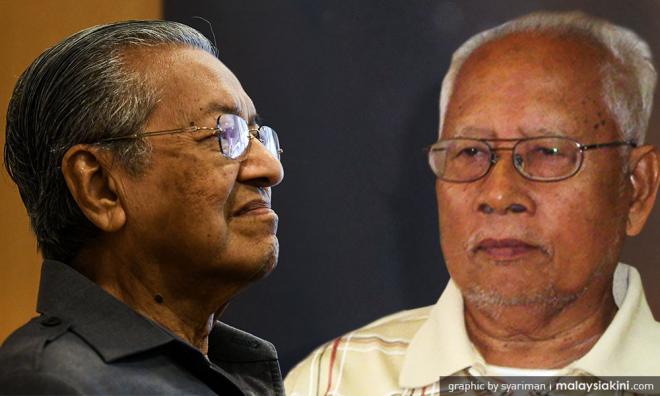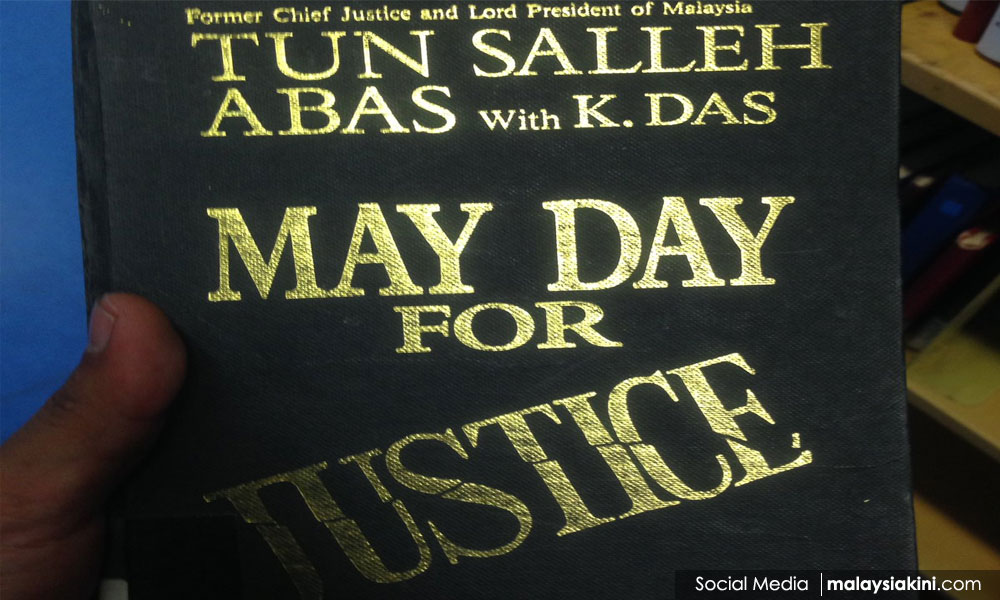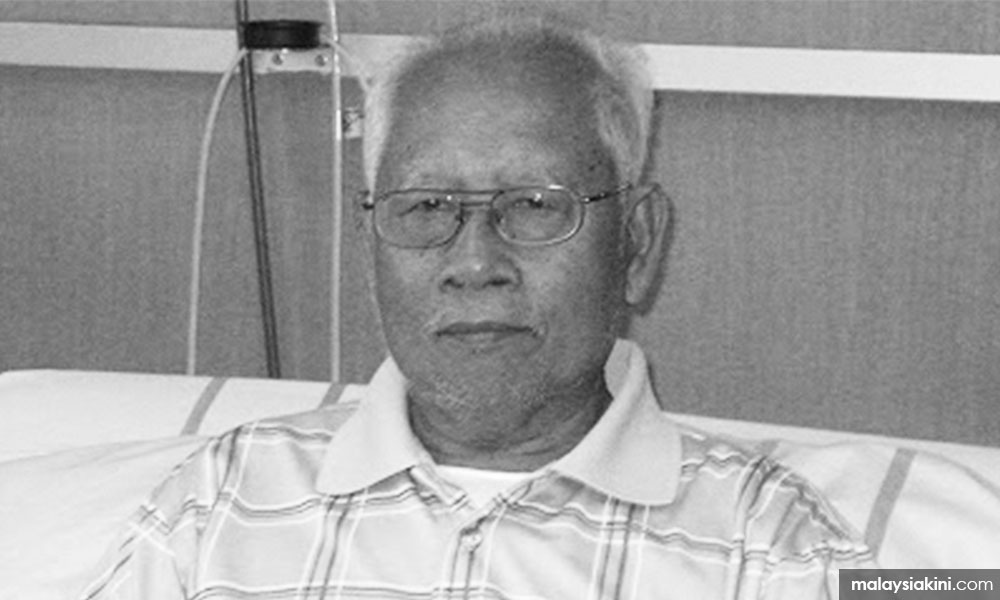
May day 1988 - justice died when Dr M sacked Salleh Abas
COMMENT | Reading the write-ups about the just departed Mohamed Salleh Abas, the former lord president of the judiciary, it is sad that many are missing the wood of justice for the trees of political machinations.
Yet others are questioning the judge’s former court decisions. I certainly do not intend to defend Salleh’s former judgements, nor do I consider him a “hero” in my approximation.
Nevertheless, we owe it to Salleh and our younger generations to put the record straight and confront the historical facts surrounding the sacking of the former lord president by then prime minister Dr Mahathir Mohamad as laid out in Salleh's account of the case in the book May Day for Justice.
Otherwise, we will not be able to fathom the damage that was done to the judiciary by the then premier.
Umno's power struggle in the 80s
The underlying factor, which determined the uncertainty in politics ever since 1986, was the power struggle within Umno. This relentless power struggle was inevitable considering the size of the spoils of the New Economic Policy at stake.
The irreconcilable differences between Team A led by Mahathir and Team B led by Tengku Razaleigh Hamzah was the destabilising factor which dominated the ruling BN coalition. This in turn set in train other destructive forces within the coalition's member parties.
Storm clouds over politics began to gather from the time of the Umno general assembly in April 1987 when the split down the middle in the party caught the imagination of everyone. Mahathir had been re-elected by the skin of his teeth!
What followed through the subsequent months was to add to the clouds hanging over Umno - the sacking of the Team B ministers from the cabinet; Team B members going to court to seek rulings that the outcome of the April 1987 party elections be declared null and void; Umno being subsequently declared “illegal” by the court.
This court challenge by Team B of Umno was the biggest threat faced by then prime minister Mahathir.
As first prime minister Tunku Abdul Rahman put it: “Umno was facing a break-up. Prime minister Mahathir Mohamad’s hold on the party appeared critical when election rigging was alleged to have given him a very narrow victory over Tengku Razaleigh.
"The case alleging irregularities brought by Umno members was pending in court. If the judgement went against him, he would have no choice but to step down. So, he had to find a way out of his predicament.
"A national crisis had to be created to bring Umno together as a united force to fight a common enemy – and the imaginary enemy, in this case, was the Chinese community… It's not a question of Chinese against the government but his own party, Umno who are against him".
World jurists condemn Dr M for assault on judiciary
Mahathir has tried in vain to wriggle out of the responsibility for "Operation Lalang" saying it was the inspector-general of police who ordered the arrests.
Likewise, he had attempted to put the blame for the sacking of the lord president and three other Supreme Court judges on the Agong.
As I have pointed out often enough, these two outrages against democracy in 1987 and 1988 respectively are inextricably linked.
Young lawyers today might like to know the views of top jurists from around the world who reacted to this atrocious attack on the Malaysian judiciary.

In the foreword to May Day for Justice written by Salleh and K Das after the sacking of the lord president, Tunku further wrote: “I do not know how any honourable government can stay in office after this book has been published.
"It constitutes a denunciation which cannot be answered without confessing to the most dishonourable conduct in public life… it struck a terrible blow, not only to the independence of the Malaysian judiciary – and ruined the careers of at least three honourable men – but to national pride itself.”
In another foreword, then justice Michael Kirby CMG commissioner of the International Commission of Jurists (ICJ) had this to say:
“Singled out for particular mention was the concern of the ICJ about the campaign of attacks on the judiciary by the prime minister of Malaysia, the inducements made to the lord president to resign his office quietly, the apparently biased constitution of the tribunal set up to enquire into his removal, the inclusion in the tribunal, as its chairperson, of a judge who succeeded to the lord president’s office, the unprecedented action of that judge in securing the removal and suspension of Supreme Court judges who provided a stay to allow the constitutionality of the tribunal to be tested in the Malaysian Supreme Court, and the 'unpersuasive' report of the tribunal following which the lord president was removed.”
The highly respected former lord president Mohamed Suffian Hashim had this to say on the sordid affair and he pointed his finger squarely at Mahathir: “The disgrace brought to Malaysia by prime minister Dr Mahathir Mohamad in dismissing the lord president, Salleh Abas, and two senior Supreme Court judges will long hang around his neck like an albatross.
"What the PM did astounded the nation and the appalling news was swiftly spread to all four corners of the globe… Salleh has since revealed all the facts leading to, and regarding the so-called inquiry into his alleged misbehaviour.
"Facts which because of the prime minister’s total control of the mass media he was able at the time to keep from public knowledge and which were also kept out of the knowledge of the two foreign members of the tribunal who came from Sri Lanka and Singapore.”
The Bar Council at the time also did not mince their words in a statement: “From the prime minister’s attacks on the judiciary, it appears that he seriously misconceives the doctrine of the separation of powers… It is not for the executive to tell the judges how to construe the laws.”
In 1990, when DAP's Lim Kit Siang was opposing Mahathir, he alleged: “The prime minister and the attorney-general had refused to throw light on this shocking discrepancy, which raised doubts as to whether the prime minister ever had an audience with the Yang di-Pertuan Agong on May 1, 1988… Grave doubts and mystery surround the judicial crisis of 1988.”



There were many other eminent jurists from around the world who were aghast at this flagrant assault on one of the vital institutions of any democracy.
They include Geoffrey Robertson QC; Hugo Young; PN Bhagwati, former chief justice of India; Prof Andrew Harding writing for the Commonwealth Judicial Journal; Bernard Levin of The Times, London; Prof FA Trinidade of The Law Quarterly Review and Nihal Jayawickkarama of the University of Hong Kong.
All of them were quite clear in pointing their fingers at the prime minister of the day for the sacking of Salleh, namely, Mahathir.

In his book May Day for Justice, Salleh’ denunciation of Mahathir begins on the first page itself: “When all else is forgotten, this question alone may remain to haunt us: Did I lie when I said the prime minister of Malaysia accused me of being biased in cases involving the political party, Umno?
"Did I invent this story that the prime minister raised the matter when he gave me the reasons why I was found unsuitable to remain lord president of the Supreme Court of Malaysia and should therefore step down? That because of my speeches about Umno I was biased as a judge?
“I have no doubt – and few would now disagree – that it was the Umno saga that led to my destruction as a judge.”
I urge those who have forgotten or were too young to know the truth about Mahathir’s assault on the judiciary to read the two books by Salleh and Das.
Alas, Mahathir’s legacy in tarnishing the judiciary by sacking Salleh will never be obliterated while there are still good men and women ready to defend the truth, justice, democracy and human rights.
Rest in peace now Salleh.
KUA KIA SOONG is adviser of Suara Rakyat Malaysia (Suaram).
What kind of circular logik is KT using? Wasn’t Anwar in gomen then? But now KT ok with him but not LKS? I think KT oso hypo lah.
ReplyDeletelike that can rest in peace kah? more sound like a keris or bullet than peace.
ReplyDelete